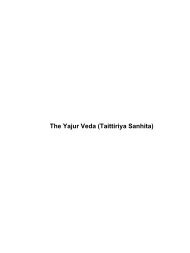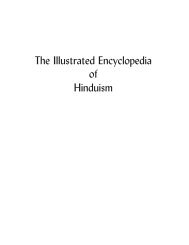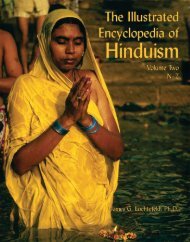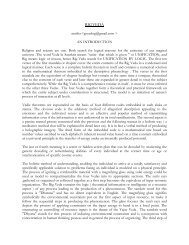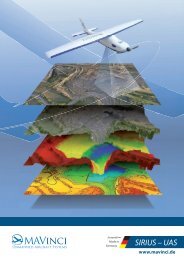A Concise Encyclopedia of Hinduism Klaus K Klostermaie
Create successful ePaper yourself
Turn your PDF publications into a flip-book with our unique Google optimized e-Paper software.
moon 120<br />
moon<br />
The hundreds <strong>of</strong> synonyms and epithets<br />
for the moon in Hindu literature (e.g.<br />
candra(mä), soma, ÿaÿï, ÿaÿäöka, rajanïkara,<br />
niÿäketu, niÿäpati, tärädhipati<br />
etc.) indicate its great importance. In<br />
Vedic times the moon was believed to<br />
be the abode <strong>of</strong> the blessed forefathers.<br />
It was also believed to be the source <strong>of</strong><br />
nectar, which was distilled from its rays.<br />
New moon (ämavasya) and full moon<br />
(pürnimä) were the occasions <strong>of</strong> the<br />
archetype <strong>of</strong> all Vedic ritual sacrifices<br />
(darÿapürnamäsa), and the moon-days<br />
(tithis) are the basic time units for religious<br />
observances such as fasting. The<br />
moon is worshipped in the form <strong>of</strong> the<br />
god Soma in the Vedas, Candra in later<br />
times, and has many other names. (See<br />
also CALENDAR; SACRIFICE.)<br />
mothers<br />
See MÄTØKÄS.<br />
møtyu-saskära<br />
See ŸRADDHA.<br />
Mudalvan<br />
A Tamil god, later identified with ŸIVA.<br />
mudrä (‘seal’)<br />
This can also be a seal-ring, a mark, an<br />
impression, a gesture, a medal or<br />
stamped coin; mystery (in Tantricism);<br />
certain positions <strong>of</strong> fingers, e.g. abhayamudrä,<br />
gesture <strong>of</strong> reassurance.<br />
muhürta<br />
In general, a short period <strong>of</strong> time, an<br />
instant; specifically, one-thirtieth <strong>of</strong> a day<br />
(48 minutes). (See also TIME, DIVISIONS OF.)<br />
Muktananda, Swami<br />
(1908–83)<br />
Founder <strong>of</strong> Siddha Dham, a KUŒ¥ALIŒÏ<br />
Yoga meditation centre in Ganeshpuri,<br />
near Bombay. On a world tour in 1974<br />
he also found many Western disciples.<br />
After his death Malti and Subhash<br />
Chetty (Swami Cidvilasananda and<br />
Swami Nityananda) continued the<br />
ashram activities.<br />
mukti<br />
See LIBERATION.<br />
Müller, Friedrich Max<br />
(1823–1900)<br />
Son <strong>of</strong> the German poet Wilhelm<br />
Müller, ‘Max Müller’, as he is usually<br />
called, spent most <strong>of</strong> his working life in<br />
Oxford. While active in many fields –<br />
he is called the founder <strong>of</strong> the discipline<br />
<strong>of</strong> comparative religion, did groundbreaking<br />
work in linguistics and in the<br />
study <strong>of</strong> fables, edited and translated<br />
Buddhist works – his contributions to<br />
the study <strong>of</strong> <strong>Hinduism</strong> were so impressive<br />
that Hindu pandits gave him the<br />
title Mok•a Mülä (‘Root <strong>of</strong><br />
Liberation’). He published the first critical<br />
text edition <strong>of</strong> the Øgveda with<br />
Säyaæa’s commentary in six volumes<br />
(1849–73), initiated the 50- volume<br />
series Sacred Books <strong>of</strong> the East, to<br />
which he contributed several volumes<br />
<strong>of</strong> translations (Vedas, Upani•ads,<br />
Gøhya Sütras), published a book on<br />
Ramakrishna (1898) after meeting<br />
Swami Vivekananda, and a course <strong>of</strong><br />
lectures on The Six Systems <strong>of</strong> Indian<br />
Philosophy (1899). While some <strong>of</strong> his<br />
work has been superseded by more<br />
recent scholarship and some <strong>of</strong> his theories,<br />
such as the Äryan invasion <strong>of</strong><br />
India and the chronology based on it,<br />
have become controversial, his name is<br />
held in high esteem in India as one <strong>of</strong><br />
the pioneers <strong>of</strong> Indology in the West.<br />
Muæõaka Upani•ad<br />
One <strong>of</strong> the principal Upani•ads, famous<br />
for its distinction between para (higher)<br />
and apara (lower) knowledge.




